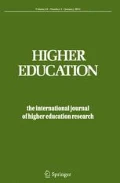Abstract
This paper is a description of the structural organization, conceptions and knowledge of their own learning possessed by 40 teachers ranging in age from 23 to 53 years, studying as adult learners in an inservice course concerned with adult learning. It is based on their written statements about learning at the beginning of a one semester subject. The statements were categorised by structural organization according to a modification of the SOLO Taxonomy for tertiary students' knowledge of learning and the content at each level of the Taxonomy was analysed. Eighty percent of the students gave responses at the multistructural level. The content of responses fell into four categories; beliefs about learning; factors influencing learning; learning processes; and learning outcomes. The content of responses varied between SOLO levels. Very little mention was made in any of the responses of factors considered to be typical of adult learning. The results suggest that even teachers such as these need to learn more about learning in order to become independent self-directed learners.
Similar content being viewed by others
References
Biggs, J.B. (ed.) (1991). Teaching for Learning: the View from Cognitive Psychology. Hawthorn, Victoria: ACER.
Biggs, J.B. (1992). ‘A qualitative approach to grading students’, HERDSA News 14 (3), 3–6.
Biggs, J.B. (1992). ‘Modes of learning, forms of knowing, and ways of schooling’, in Demetriou, A., Shayer, M. and Efklides, A. (eds.), Neo-Piagetian Theories of Cognitive Development. London: Routledge, pp. 31–25.
Biggs, J.B. (1993). ‘What do inventories of students learning processes really measure? A theoretical review and clarification’, British Journal of Educational Psychology 63, 3–19.
Biggs, J.B. and Collis, K.F. (1982). Evaluating the Quality of Learning: The SOLO Taxonomy. New York: Academic Press.
Biggs, J.B. and Collis, K.F. (1989). ‘Towards a model of school-based curriculum development and assessment: using the SOLO Taxonomy’, Australian Journal of Education33, 149–161.
Boulton-Lewis, G.M. (1992). ‘The SOLO taxonomy and levels of knowledge of learning’, Research and Development in Higher Education15, 482–489.
Boulton-Lewis, G.M. (1994) ‘Tertiary students' knowledge of their own learning and a SOLO Taxonomy’, Higher Education28, 387–402.
Boulton-Lewis, G.M. and Dart, B.C. (1994). ‘Assessing students? knowledge of learning: a comparison of data collection methods’, in Gibbs, G. (ed.), Improving Student Learning: Theory and Practice. OCSD: Oxford.
Brookfield, S.D. (1991). Understanding and Facilitating Adult Learning. Buckingham, UK: Open University Press.
Dart, B.C. (1994). ‘Teaching for improved learning in small classes in higher education’. Paper presented at the annual conference of the Australian Association for Research in Education, November 1994, University of Newcastle, Australia.
Entwistle, A. and Entwistle, N. (1992). ‘Experiences of understanding in revising for degree examinations’, Learning and Instruction2, 1–22.
Entwistle, N. and Entwistle, A. (1991). ‘Developing, revising, and examining conceptual understanding in degree courses: the student experience and its implications’. Research Report, Edinburgh: Centre for Research on Learning and Instruction.
Knowles, K.G. (1990). The Adult Learner: A Neglected Species. Houston, Texas: Gulf Publishing.
Marton, F. and Saljo, R. (1976). ‘On qualitative differences in learning. I - outcome and process’, British Journal of Educational Psychology46, 4–11.
Marton, F. and Saljo, R. (1984). ‘Approaches to learning’, in Marton, F., Hounsell, D. and Entwistle, N.J. (eds.), The Experience of Learning. Edinburgh: Scottish Academic Press.
Marton, F., Dall'Alba, G. and Beaty, E. (1993). ‘Conceptions of learning’, International Journal of Educational Research 19(3), 277–300.
Richards, T. and Richards, L. (1991). ‘Data base organisation for qualitative analysis: the NUDIST system’. Technical Report No. 18/91. Melbourne, Australia: La Trobe University.
Saljo, R. (1979). ‘Learning about learning’, Higher Education8, 443–451.
Author information
Authors and Affiliations
Rights and permissions
About this article
Cite this article
Boulton-Lewis, G.M., Wilss, L. & Mutch, S. Teachers as adult learners: their knowledge of their own learning and implications for teaching. High Educ 32, 89–106 (1996). https://doi.org/10.1007/BF00139220
Issue Date:
DOI: https://doi.org/10.1007/BF00139220




